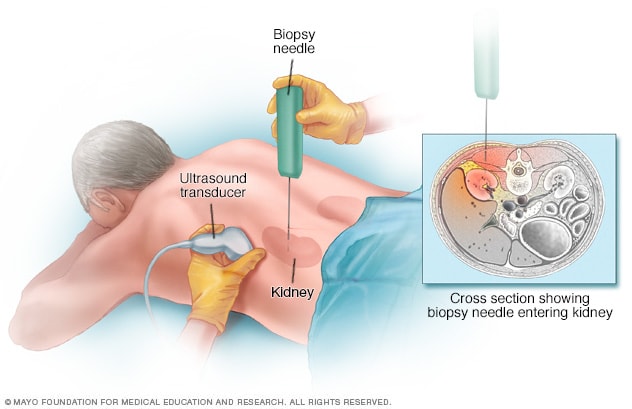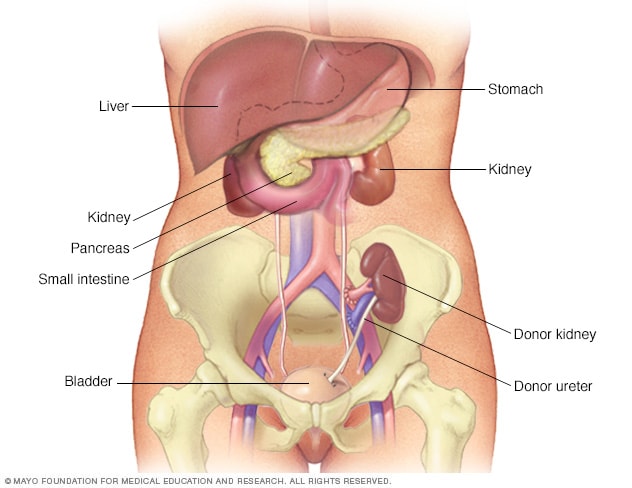Diagnosis
Kidney biopsy

Kidney biopsy
During a kidney biopsy, your doctor uses a needle to remove a small sample of kidney tissue for lab testing. The biopsy needle is inserted through your skin and is often directed using the guidance of an imaging device, such as ultrasound.
To diagnose end-stage renal disease, your health care provider may ask you about your family's and your medical history. You may also have physical and neurological exams, along with other tests such as:
- Blood tests, to measure the amount of waste products, such as creatinine and urea, in your blood
- Urine tests, to check the level of the protein albumin in your urine
- Imaging tests, such as ultrasound, MRI or CT scan, to assess your kidneys and look for unusual areas
- Removing a sample of kidney tissue (biopsy), to examine under a microscope to learn what type of kidney disease you have and how much damage there is
Certain tests might be repeated over time to help your provider follow the progress of your kidney disease.
Stages of kidney disease
There are five stages of kidney disease. To determine what stage you have, your health care provider performs a blood test to check your glomerular filtration rate (GFR). The GFR measures how much blood the kidneys filter each minute, recorded as milliliters per minute (mL/min). As the GFR declines, so does your kidney function.
When your kidneys no longer work at a level that's necessary to keep you alive, you have end-stage renal disease. End-stage renal disease usually occurs when kidney function is less than 15% of typical kidney function.
As a part of kidney disease staging, your provider also might test whether you have protein in your urine.
| Kidney disease stage |
GFR, mL/min |
Kidney function |
| Source: National Kidney Foundation |
| Stage 1 |
90 or above |
Healthy kidney function |
| Stage 2 |
60 to 89 |
Mild loss of kidney function |
| Stage 3a |
45 to 59 |
Mild to moderate loss of kidney function |
| Stage 3b |
30 to 44 |
Moderate to severe loss of kidney function |
| Stage 4 |
15 to 29 |
Severe loss of kidney function |
| Stage 5 |
Less than 15 |
Kidney failure |
Treatment
Start Your Donor Evaluation
Get started as a living kidney or liver donor by completing this health history questionnaire.
End-stage renal disease treatments include:
- Kidney transplant
- Dialysis
- Supportive care
Kidney transplant
Kidney transplant

Kidney transplant
During kidney transplant surgery, the donor kidney is placed in your lower abdomen. Blood vessels of the new kidney are attached to blood vessels in the lower part of your abdomen, just above one of your legs. The new kidney's urine tube (ureter) is connected to your bladder. Unless they are causing complications, your own kidneys are left in place.
A kidney transplant is a surgical procedure to place a healthy kidney from a live or deceased donor into a person whose kidneys no longer function properly. A kidney transplant is often the treatment of choice for end-stage renal disease, compared with a lifetime on dialysis.
The kidney transplant process takes time. It involves finding a donor, living or deceased, whose kidney best matches your own. You then have surgery to place the new kidney in your lower abdomen and attach the blood vessels and ureter — the tube that links the kidney to the bladder — that will allow the new kidney to function.
You may need to spend several days to a week in the hospital. After leaving the hospital, you can expect frequent checkups to monitor your progress as your recovery continues. You may take a number of medications to help keep your immune system from rejecting your new kidney and to reduce the risk of post-surgery complications, such as infection.
After a successful kidney transplant, your new kidney filters your blood, and you no longer need dialysis.
Dialysis
Dialysis does some of the work of your kidneys when your kidneys can't do it themselves. This includes removing extra fluids and waste products from your blood, restoring electrolyte levels, and helping control your blood pressure.
Dialysis options include peritoneal dialysis and hemodialysis.
Peritoneal dialysis
During peritoneal dialysis, blood vessels in your abdominal lining (peritoneum) fill in for your kidneys with the help of a fluid that washes in and out of the peritoneal space. Peritoneal dialysis is done in your home.
This name refers to the lining that surrounds the organs in your abdomen. That lining is called the peritoneal membrane. It forms a space that can hold fluid. With peritoneal dialysis, a permanent catheter is inserted through the lining into the space around your organs. Dialysis solution is drained through the catheter into that space. The peritoneal lining contains many blood vessels. The solution draws extra fluid, chemicals, and waste out of those blood vessels and through the lining. The lining acts as a filter. The solution is left in place for a number of hours while dialysis occurs. Then it's allowed to drain out through the catheter. New, clean solution is immediately drained in, filling up the space again. This process of exchanging old solution with new is called an exchange.
Hemodialysis
During hemodialysis, a machine does some of the work of the kidneys by filtering harmful wastes, salts and fluid from your blood. Hemodialysis may be done at a center or in your home.
Your blood is run through a filter that acts as an artificial kidney. The filter removes the extra fluid, chemicals, and waste from your blood. The cleaned blood is then pumped back into your body. Two needles are inserted for every treatment. The place they are inserted is called the access. A surgeon may connect two of your blood vessels to create an access. This is called a fistula. Connecting the vessels causes the vein to get larger and stronger. The dialysis needles are inserted into that vein.
Another option is to connect a plastic tube between two blood vessels. This is called a graft. The needles are inserted into this artificial vein. In urgent situations, a tube, called a catheter, may be placed temporarily into a large vein in your neck. The tube has two branches, one to carry blood out of the body and the other to return it. Your physician will make a recommendation based on the condition of your veins and other considerations.
For dialysis to be successful, you may need to make lifestyle changes, such as following certain dietary recommendations.
Palliative care
If you choose not to have a kidney transplant or dialysis, you can choose palliative or supportive care to help you manage your symptoms and feel better. You also can combine palliative care with kidney transplant or dialysis.
Without either dialysis or a transplant, kidney failure progresses, eventually leading to death. Death can occur quickly or take months or years. Supportive care might include management of symptoms, measures to keep you comfortable and end-of-life planning.
Clinical trials
Explore Mayo Clinic studies testing new treatments, interventions and tests as a means to prevent, detect, treat or manage this condition.
Lifestyle and home remedies
As part of your treatment for kidney disease, your health care provider might recommend that you follow a special diet to help support your kidneys and limit the work they must do. Ask for a referral to a registered dietitian with expertise in kidney disease to learn ways to make your diet easier on your kidneys.
Depending on your situation, kidney function and overall health, your dietitian might recommend that you:
- Avoid products with added salt. Lower the amount of sodium you eat each day by avoiding products with added salt, including many convenience foods, such as frozen dinners, canned soups and fast foods. Other foods with added salt include salty snack foods, canned vegetables, and processed meats and cheeses.
-
Choose lower potassium foods. Your dietitian might recommend that you choose lower potassium foods at each meal. High-potassium foods include bananas, oranges, potatoes, spinach and tomatoes.
Examples of low-potassium foods include apples, cabbage, carrots, green beans, grapes and strawberries. Be aware that many salt substitutes contain potassium, so you generally should avoid them if you have kidney failure.
- Limit your protein. Your dietitian will estimate the grams of protein you need each day and make recommendations based on that amount. High-protein foods include lean meats, eggs, milk, cheese and beans. Low-protein foods include vegetables, fruits, breads and cereals.
Coping and support
Learning you're in kidney failure can come as a shock, even if you've known about your kidney disease for a while. It might be difficult to manage the treatment schedule if you're on dialysis.
To help you cope, consider trying to:
- Connect with other people who have kidney disease. It might help you to talk to other people with end-stage renal disease Ask your doctor about support groups in your area. Or contact organizations such as the American Association of Kidney Patients, the National Kidney Foundation or the American Kidney Fund for groups in your area.
- Maintain your routine, when possible. Try to continue to work and do the activities you enjoy, if your condition allows.
- Be active most days of the week. With your provider's approval, aim for at least 30 minutes of physical activity most days of the week. This can help you with fatigue and stress.
- Talk with someone you trust. It might help to talk about your feelings with a friend or family member, a faith leader, or someone else you trust. Your provider might be able to recommend a social worker or counselor.
Preparing for your appointment
For end-stage renal disease, you'll likely continue to see the same health care provider and care team you've been seeing for treatment of chronic kidney disease. If you're not already being cared for by a doctor who specializes in kidney problems (nephrologist), you might be referred to one as your disease progresses.
What you can do
To get ready for your appointment, ask if there's anything you need to do ahead of time, such as make changes to your diet. Then take note of:
- Your symptoms, including any that seem unrelated to your kidneys or urinary function, and when thy began
- All your medications and doses, vitamins or other supplements you take
- Your key medical history, including other medical conditions and family history of kidney disease
- Questions to ask your provider
Take a family member or friend along, if possible, to help you remember the information you're given.
For end-stage renal disease, some basic questions to ask your provider include:
- What's the level of damage to my kidneys?
- Is my kidney function worsening?
- Do I need more tests?
- What's causing my condition?
- Can the damage to my kidneys be reversed?
- What are my treatment options?
- What are the potential side effects of each treatment?
- I have these other health conditions. How can I best manage them together?
- Do I need to eat a special diet?
- Can you refer me to a dietitian who can help me plan my meals?
- Are there brochures or other printed material I can have? What websites do you recommend?
- How often do I need to have my kidney function tested?
Don't hesitate to ask any other questions you have.
What to expect from your health care provider
Your provider may ask you questions, such as:
- Have you noticed changes in your urinary habits or unusual fatigue?
- Have you been diagnosed or treated for high blood pressure?
Oct. 10, 2023